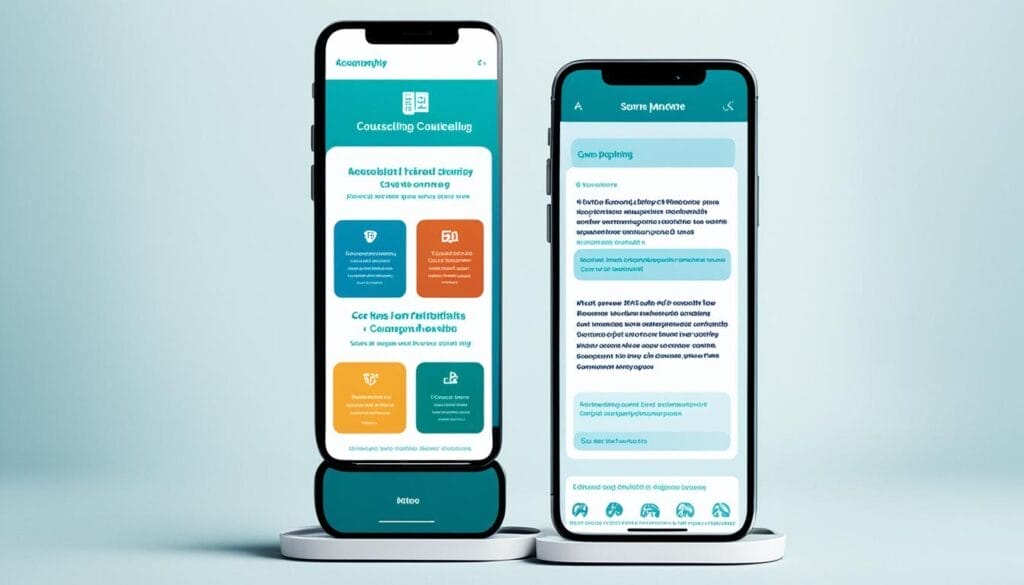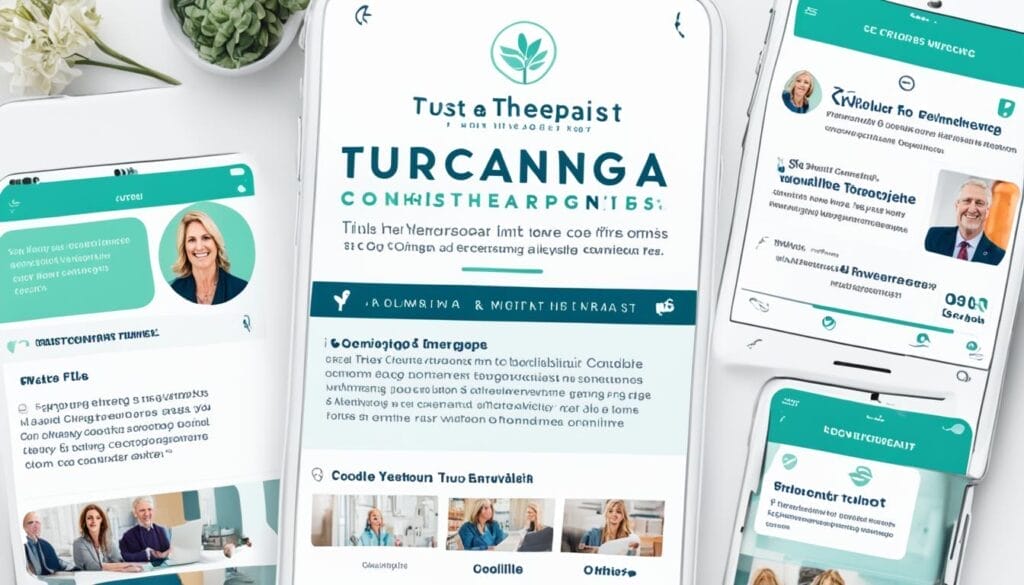G’day! I’m Chris from Loudachris Digital Marketing in Adelaide. Today, nearly everyone looks online for help. How can counselors stand out and be seen as helpful guides? With tons happening online every second, how do you get seen? It’s about smart digital marketing for therapists. Being seen online is crucial, not optional. But, it can be tricky to market mental health without getting lost.
Let’s explore digital marketing for mental health pros. You need to be in the right online spots, ace SEO, and make content that speaks to people. With tighter budgets for therapy, your marketing must make sure your help gets seen. We’ll mix fresh ideas with tried methods to get your practice noticed online. And, help you find more clients.
Also, marketing shouldn’t be scary. It should feel like a key part of your work. Your aim isn’t about selling, but offering real help. Marketing is about offering support to those in need. Ready to see how digital marketing can change your reach and impact? Click here for a free audit https://www.loudachris.com.au/contact.
Key Takeaways
- Understanding the high search volume opportunities available to therapists through SEO.
- Importance of integrating digital marketing with traditional networking and referral strategies.
- Benefits of a solid online presence, including directory listings and effective use of UTMs.
- SEO’s critical role in leading potential clients to quality counseling services.
- Creating diverse, engaging content to differentiate and highlight the unique aspects of your practice.
- The financial viability of investing in marketing strategies for long-term profitability.
- Best practices in digital marketing, such as paid advertising, that are key to therapy services’ growth.
Understanding the Basics of Digital Marketing for Counselors
For counselors wanting a strong online presence, understanding digital marketing is key. It helps us reach more people and connect with clients online. There are many strategies to boost our online visibility. This ensures we meet potential clients where they spend a lot of time: online.
The Importance of an Online Presence for Therapists
Enhancing Therapists’ Online Presence is now essential for our practice’s growth. Most clients find us online first. A strong online presence builds trust. It prepares clients for their first meeting with us. Using specific digital strategies can greatly improve our connections with those needing our help.
Stats prove that a good website increases visibility and helps get more clients. Our websites must work well on phones. Many people use their mobiles to look up things online. Adding local SEO helps us attract people from our own area. This boosts our practice’s local importance.
Key Digital Channels to Explore
To adopt Multi-Channel Digital Marketing Approaches, we should use various platforms. Start with a good website. Then, reach out through blogs, SEO content, and social media. Using paid ads can quickly bring more people to our website.
Tools like Google Analytics show how well our SEO is working. They give us info on what users do on our website. Add in smart email marketing and manage online reviews to keep clients loyal. Boosting our professional image with each digital channel helps increase our presence and client interactions.
Branding and Identity in the Digital Sphere
In today’s world, creating a strong counseling brand identity is key to stand out. As a digital marketer, I’ve learned that a unique identity captures your practice’s core. It also makes your presence strong online.
For therapists, having a Unique Selling Proposition is more than listing qualifications. It’s about showing what makes you different. This could be an innovative therapy method or a focus on a certain group of people. This way, the right clients find you—those looking for exactly what you offer.
Being consistent is important in marketing. For therapists, being consistent with your brand helps clients trust and stick with you. When your brand’s voice, look, and messages match, clients get a consistent experience. This is very important in therapy, where feeling safe and understood is key.
To keep your brand consistent, plan your marketing well. Use the same strategy on your website and social media.
Here are some benefits of keeping a consistent brand:
| Benefit | Description |
|---|---|
| Enhanced Visibility | Using the same visuals and tone everywhere makes your brand easier to recognize. This helps clients remember and choose you over others. |
| Increased Trust | Clients trust you more when they see the same quality everywhere they find your brand. |
| Client Retention | A clear and consistent brand builds an emotional link. This makes clients keep coming back. |
The online world is always changing, and your brand should too. Regularly updating your brand strategy keeps it interesting. This helps keep your current clients and attracts new ones looking for a standout therapist.
Ready to boost your digital branding? Feel free to reach out on my contact page. I offer a free audit of your current strategy and tips on digital marketing to improve it for your therapy practice.
Crafting a User-Friendly Website for Your Counseling Practice
In this digital era, every therapist needs a User-Friendly Web Design for Psychologists. Your website is like an Online Business Card for Therapists. It should be easy to use, especially on mobiles. Here are some tips to make your site welcoming and helpful.

Nowadays, most people use their phones to browse the internet. There are about 4.9 billion users worldwide. So having a Mobile-Friendly Therapy Website is crucial. Your site must work well on any screen, reaching 95% of Americans on mobile devices.
Design Considerations for Therapist Websites
Your site’s look and feel should mirror your practice’s calm and professional vibe. Use soft colors and easy-to-read fonts to make visitors feel at ease. Good photos can also make your site more engaging. They show the warmth of your service
Essential Features of a Counseling Service Website
Your website’s layout must be simple. Everyone should find the ‘About’, ‘Services’, and ‘Contact’ pages easily. This is crucial for those looking up health info on their phones. Your site needs to be fast and easy to read on any device.
Adding SEO is key to getting found online more easily. Having clear contact forms helps people reach out to you. Share stories about your work on the About page. It builds a bond with potential clients.
| Feature | Importance | Impact |
|---|---|---|
| Responsive design | Essential for mobile users | Improves accessibility and user satisfaction |
| Professional photography | High | Increases engagement and trust |
| SEO optimization | Critical | Enhances online visibility |
| Contact forms | Important | Facilitates communication and booking |
| Personalized content | Very important | Deepens client connection |
Keep these user-friendly design tips in mind to build a site that draws people in. It will be a key part of your online marketing.
Navigating the World of SEO for Mental Health Professionals
I work with digital marketing in Adelaide. I’ve learned the balance between tech skills and keeping users interested. I focus on SEO Strategies for Therapists, Content Creation for SEO, and Technical SEO for Counseling Sites. My goal is to help mental health pros get noticed online.
For SEO Strategies for Therapists, using the right keywords is key. We look at what potential clients are looking for. For instance, “female therapist near me” is searched 480 times a month. This shows it’s important to target such key phrases.
Content Creation for SEO is crucial. It involves making content that answers common questions. Let’s say a lot of people ask about “couples counseling”. By creating content on this topic, a site’s appeal goes up.
With Technical SEO for Counseling Sites, making a site easy to use is essential. This means having a good site design. It should be easy for Google to find and show your site without problems.
- Optimizing site speed to reduce bounce rates and improve user experience
- Implementing responsive design to cater to mobile users
- Strategic use of alt tags in images to improve SEO as well as accessibility
Here’s how some elements help a therapist’s website get more visitors:
| SEO Element | Role in Therapy Sites | Impact on Traffic |
|---|---|---|
| Long-Tail Keywords | Target specific queries like “anxiety therapy in Adelaide” | Increase in niche traffic leading to higher conversion rates |
| Local SEO | Optimization for local search terms | Attracts local clientele, vital for counseling services |
| Content Length | Long-form content generally performs better | Enhanced engagement and longer site visits |
| Backlinks | Secure links from reputable sites to boost authority | Improved domain authority and search rankings |
Understanding these elements can help a counseling site’s rank, bringing in more clients. If you want to better your online marketing, contact me at Loudachris Digital Marketing for a free audit. Let’s make your digital presence stronger together.
Content Marketing Strategies for Engaging Potential Clients
For counselors, using smart content marketing is key to reaching out. Sharing Valuable Mental Health Content helps. It makes you a trusted source and gives people the help they need. Here are ways to do this well:
Creating Valuable Content for Your Audience
First, know what your audience needs and what they struggle with. Your content, like blog posts or videos, should speak to them. It’s good to use SEO-Optimized Blogging for Counselors. It makes your site easy to find and raises your profile online.
Blogging as a Tool for Thought Leadership
Blogging isn’t just about writing. It’s a way to share your ideas and build trust. By posting quality, SEO-focused blogs, you become a go-to person. Good blogs pull in readers and help them make smart choices about their mental health.
Here are some key points for engaging content and how it attracts clients:
| Content Type | Purpose | Impact |
|---|---|---|
| Valuable Mental Health Articles | To educate and provide solutions | Increases engagement and trust |
| SEO-Optimized Blogging | To attract more site visitors | Enhances online visibility and credibility |
| Infographics | To simplify complex information | Boosts shareability and understanding |
| Videos | To engage users more deeply | Encourages longer site visits |
Knowing how to create stories through different content forms is key. Strategic Content Calendars help plan this. These efforts improve SEO and help build early trust with clients.
If you’re a counselor wanting to grow online, get in touch. We can make a plan just for you and your audience. For tips or a free audit, visit here.
Building Trust Through Social Media Marketing for Therapists
I work as a digital marketing specialist at Loudachris in Adelaide. I’ve seen how social media can build trust and raise brand awareness for therapists. It’s a bit scary at first, looking at all the social platforms. Yet, they’re great for connecting with more people.
Picking the right social media platforms is key. Facebook and Instagram help reach lots of people, including young ones looking for mental health tips. Instagram is great for sharing your work visually and for sharing stories of healing. Facebook is good for articles and live talks, which lets people talk more deeply and build a community.
LinkedIn is best for professional connections. It’s where mental health pros can network, get referrals, and share important info. This shows you know your stuff.
Focus on maybe 2-3 platforms for better results. Regular, meaningful posts help people remember your brand and trust you. It’s all about making real connections, not just posting for the sake of it.
Being active with your followers is very important. Answer comments quickly, talk in your posts, have Q&A sessions, and use polls. It shows you’re a real person who cares and listens.

Don’t forget to watch how your posts are doing. Look at likes, clicks, and other important numbers. This helps you know what works and what doesn’t. Using this info helps make your strategy even better.
In the end, good social media work needs planning, real talks, and always being there. This puts your clients first. It makes your practice more visible and trusted. This means more people talking and a growing business.
Want to make your social media better fit your business goals? Book a free check with us today. Let’s tackle this digital world together and grow your therapy work.
Leveraging Email Marketing for Therapists to Retain Clients
In the digital world, email marketing plays a key role for therapists. It does more than share info. It boosts direct client engagement, keeps relationships, and betters your practice’s image.
Hi, Chris here from Loudachris Digital Marketing in Adelaide. Let’s talk about how email list segmentation and email marketing compliance greatly help your practice.
Email Campaign Best Practices
Email marketing should engage current and future clients. By dividing your email list, you can target specific client needs. For instance, using data on demographics and session interests allows for personalized emails that truly connect.
Great subject lines and a clear call to action (CTA) are also vital. They ensure your email is not only opened but also acted upon. Offering valuable content, like educational pieces or updates, keeps your audience interested and follows email marketing compliance.
The Power of Personalised Communication
Personalizing emails can really boost engagement. Using first names and matching content to clients’ interests makes emails feel special. This personal touch changes plain emails into meaningful interactions, crucial for direct client engagement.
Regular emails keep your clients in the loop. They show you care beyond sessions. This builds trust and shows their well-being is always a priority.
| Platform | Key Features | Best For |
|---|---|---|
| ConvertKit | Visual automation, easy segmentation | Therapists focusing on advanced personalisation |
| MailChimp | Intuitive design, comprehensive reporting | Therapists new to email marketing |
| MailerLite | Simple interfaces, powerful segmentation tools | Cost-conscious practices |
Use these best practices and pick the right platform to make the most of email marketing. This can grow your practice by numbers, satisfaction, and loyalty. For more advice, book a free audit with me anytime.
The Role of PPC for Counselors in Attracting Immediate Traffic
I’m an expert in digital marketing, focusing on mental health. I’ve seen Pay-Per-Click Advertising for Therapists change practices greatly. Google Ads boost visibility and draw in those seeking help.
PPC campaigns put ads at the top of search results right away. This grabs the attention of potential clients fast. It’s key because many need immediate support. Targeted keywords help attract the right clients.
Pay-Per-Click Advertising for Therapists is great for its control and tracking. We can see how every dollar is spent. This helps us make campaigns better for a higher return.
Landing page optimization is also vital. It makes sure visitors have a smooth journey on your site. This encourages them to book a consultation. Good landing pages turn more visitors into clients.
I’ve worked with platforms like Funnel Boost Media and WebFX. We’ve created PPC strategies that meet the mental health sector’s needs. These platforms offer superb tools and knowledge for targeted campaigns.
If you’re a therapist wanting to use Pay-Per-Click Advertising, get in touch for a free marketing check. Visit Loudachris Digital Marketing for a free audit. Let’s boost your visibility and connect you with those in need.
Why Good Web Design for Psychologists Matters
Understanding Therapeutic Web Design Principles in your practice is very important. The look and function of your site can deeply touch those looking for help. It’s more than just looks; it’s about making an Intuitive Interface for Practitioner’s Site. This builds trust and helps people start their journey to better mental health.
Aligning Design with Your Practice’s Philosophy
Your site is often the first thing new clients see. A site that shows what you believe in can make a big difference. For example, a simple design can show calmness, attracting those who want peace. Using User Engagement for Therapy Websites means your site works well on any device. This makes sure your message is clear to everyone.
Improving User Experience on Therapy Websites
Making your site easy to use is about more than just looks. It’s about how simple it is for visitors to find and use your info. Austin, C. (2018) says making your site load faster can help keep people interested. Make sure your site loads quickly because 53% of people on phones leave if it’s slow.
Woodside, A. G., Sood, S., & Miller, K. E. (2008) found that sharing stories on your site can make a big impact. Your site should be more than info; it should give hope. Everything, from how it’s laid out to the colors, tells your story. This should match your therapy style and the goals you have for your clients.
| Feature | Importance |
|---|---|
| Clean Layout and Navigation | Essential for reducing cognitive overload and enhancing user satisfaction. |
| Mobile-friendliness | Critical as most users access websites via mobile devices. |
| Integrated Booking Systems | Increases convenience by allowing clients to book appointments easily. |
By adding these elements, your website doesn’t just follow the top Therapeutic Web Design Principles. It also lifts User Engagement for Therapy Websites greatly. A good website design can make a visitor decide to become your client. This will help your practice grow a lot.
Coordinating Online Marketing Efforts with Traditional Strategies
Today, mixing marketing channels is key for mental health services. They aim for a big reach and a unified brand experience. It’s important to balance online and traditional marketing. This keeps you relevant and effective in healthcare today.
Integrating Digital with Face-to-Face Marketing Activities
Even with digital growth, in-person interactions are still valuable. They add more ways to connect with clients. For example, a good website and social media make services easy to find. Adding events and seminars in the community makes your practice more visible and builds trust.
Combining online marketing with networking at events is smart. This holistic approach to marketing reaches more people. It also creates stronger connections with potential patients. It makes your practice a big part of their community and online life.
Consistency Across All Marketing Platforms
It’s important to keep the same message on all platforms. This includes blogs, social media, and events. Being consistent means patients can trust your brand. They see you as dependable and informative about healthcare.
Also, using email marketing keeps your practice in patients’ minds. With a full approach, patients find your brand trustworthy. They feel you care about their health, both online and in person.
For instance, good social media marketing does more than advertise. It builds trust and community. This shows how well different marketing channels can work together.
| Marketing Strategy | Benefits | Application in Healthcare |
|---|---|---|
| Digital Presence (Website, Social Media) | Increases discoverability, Enhances patient engagement | First point of contact for many patients researching healthcare options |
| Local Involvement (Seminars, Health Fairs) | Builds community trust, Offers direct interaction with potential clients | Strengthens local reputation, often leading to referrals |
| Email Marketing | Maintains ongoing patient relationships, Personalized communication | Keeps the practice in mind through regular updates and health tips |
In conclusion, a holistic approach to marketing mixes digital and traditional ways. It not only reaches more people but also changes how a practice keeps and interacts with clients. It’s about making a smooth journey for patients. They go from digital spaces to actually visiting a healthcare provider.
Conclusion
In wrapping up, it’s key to note the big role digital marketing plays for therapists. It opens doors for growth unlike anything else. Online strategies have their challenges but are worth it. This Digital Strategy Recap for Therapists aims to highlight that. For Effective Marketing for Counseling Practices, being online is essential.
We explored many digital paths. Like creating a website that shows what you stand for. And using local SEO to get noticed online, which puts you ahead. SEO, with smart linking and keywords, lets you shine globally. It helps people everywhere find your services.
For those in Australia, wanting more clients and online views, follow these tips. Social media and emails are great tools for this. Digital methods boost your reach. If you’re up for improving, consider a free audit with my Adelaide agency. It can refine your online look. Always care for your mental health, too. Managing stress is key for us all.

Chris Lourenco is the director of Loudachris Digital Marketing, an Adelaide-based SEO, Google Ads, and web design agency. Chris excels in crafting bespoke, results-driven strategies that help businesses get more traffic, leads and sales.



